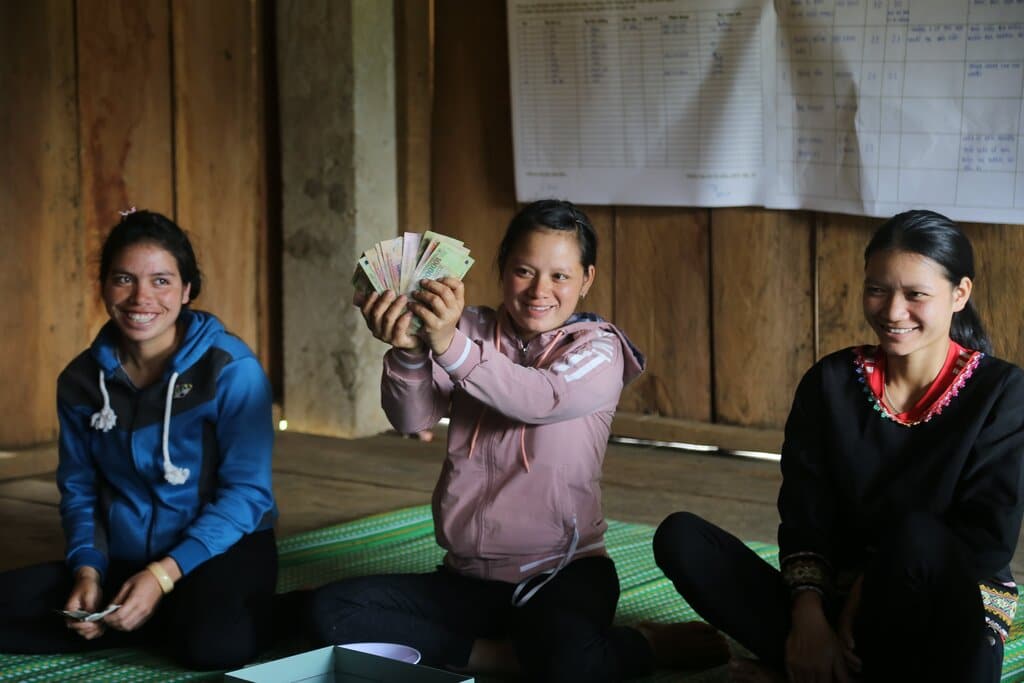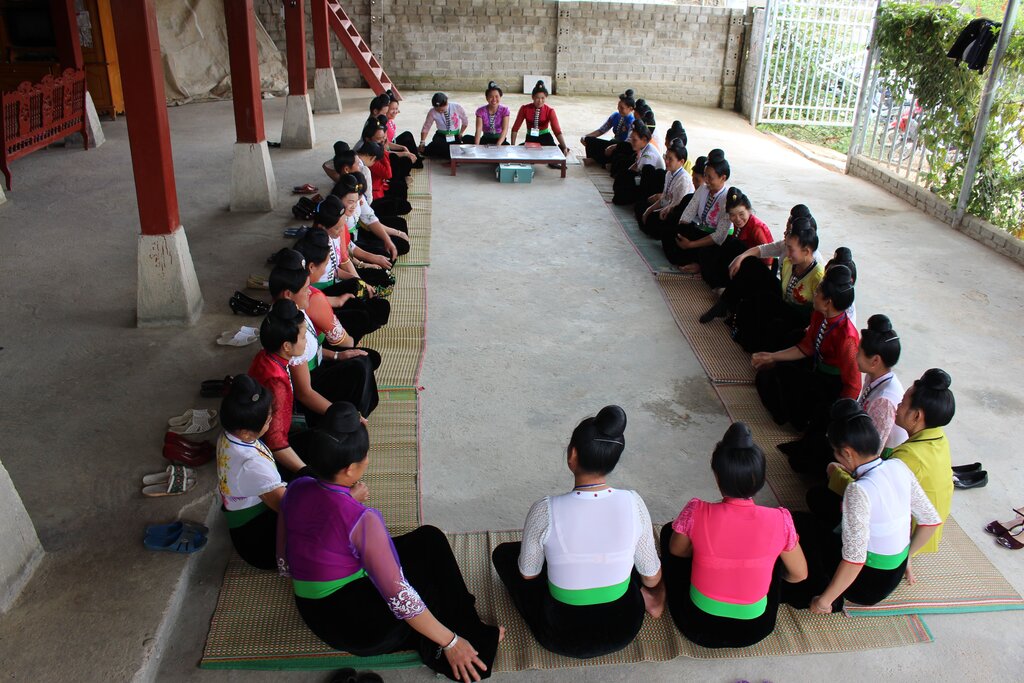Sometimes, a loan can be a lifeline for a family in crisis, but for members of Village Savings and Loan Associations and in microfinance programmes in villages around Vietnam, getting financial assistance can be a gateway to greater change. This is a story of how these programmes are helping communities around Vietnam create more sustainable and equitable futures.
—
Five years ago, Lò Thị Hà’s only sowing pig died.
For the 29-year-old living in Dien Bien Province, this was an essential source of income for her and her large family of four generations.
Thankfully, Hà knew where to turn for help.
Two years prior, her village had begun operating a women-led microfinance programme called a Village Savings and Loan Association that allows village residents to buy shares and take out loans for emergencies.
Hà borrowed 1 million Vietnamese Dong to buy another sow that ended up giving birth to ten piglets.
“Raising them up and selling them for extra income helped improve my family’s financial situation at that time,” said Hà, speaking in Vietnamese during an interview translated by Nguyen Thi Kieu Trang, marketing and communications manager for the nonprofit CARE International in Vietnam, which has facilitated 1,334 Village Savings and Loan Associations across the country.
For Hà, and so many village residents like her around Vietnam, the Village Savings and Loan Association, often referred to by its acronym, VSLA, was a lifeline that helped her family get back on its feet.
But, according to VSLA members, the association does more than support villagers in times of financial need – it promotes gender equality, education on environmental issues and information-sharing on how to solve common problems.
“VSLA is not only (about) finance,” said Le Xuan Hieu, portfolio manager for CARE International in Vietnam. “It is a platform set to provide for local people to build capacity and to share experience and to learn from each other in each meeting.”
“For example, in each meeting, they can spend about 45 minutes talking about buying the shares and borrowing money, and then they can set extra time, about the next hour, to discuss any interesting topics related to their lives [including] climate change,” Hieu said.
Climate change and environmental issues are common topics discussed at these microfinance programme meetings, which usually take place once or twice a month.
Út Quê, a 29-year-old resident of Son La Province and the head of her local VSLA chapter, said climate change has impacted the livelihoods of village residents, many of whom make their living farming coffee.
“The season doesn’t come as expected,” she said in Vietnamese during an interview also translated by Kieu Trang of CARE International. “Sometimes, it rains too heavily and for many days.”
One benefit of regular meetings of the microfinance programme is that they can be used to distribute accurate weather forecasts and agricultural advisories can help farmers adapt their practices to the changing climate, Hieu said.
For example, in recent years Son La has been experiencing cold spells that threaten farmers’ coffee plants. During VSLA meetings, group members discuss how they can protect their trees from the cold by using canopies and evaluating what tree varieties they can plant that will better withstand the variable weather.
You might also like: 5 Reasons Why Conservation Efforts Need to Support Community Livelihoods in the Decade Ahead

In tackling environmental issues, members of the group are trained in how to reduce pollution during Quê’s VSLA meetings, as well as different methods of producing coffee that will utilise less water.
In Hà’s group, members discuss how to manage waste and limit their use of single-use plastics, which have become increasingly present environmental contaminants in recent years. The water has also become polluted, making it dangerous to fish. Three people in Hà’s family are struggling with health issues that she believes are a result of the polluted environment.
In addition to environmental issues, a major theme of each VSLA chapter is women’s empowerment. Each 15-30 member group is led by women, and the leaders are rotated every year, so that different women in each village can gain experience.
According to UN Women Vietnam, women in Vietnam have limited access to formal employment and make up 69% of the workforce in vulnerable and underpaid jobs. On average, women are paid about 75% of what men earn.
Domestic violence is also prevalent with three in five ever-married women reporting that they experienced some form of violence by their intimate partner in their lifetime, according to the organisation.
Through involvement in the VSLA and the microfinance programme, women can learn about leadership, communication and financial management and take those skills back to their households, Hieu said.
Quê said that by becoming a VSLA leader, she has learned conflict resolution and communications skills, gained more confidence with speaking up, and sharing her ideas and opinions. Since getting involved with the microfinance programme, the changes within her own family are notable too, she shared.
“Me and my husband join activities about gender equality,” she said. “We share the housework, which is not really normal. For centuries, housework has been considered a woman’s task. Now, we can lift the burden of housework off my shoulders.”
In order to continue facilitating VSLAs in villages around the country, Kieu Trang said CARE International is working on digitising learning materials and having them on an accessible platform.
“So that people from different parts of the country, when they have the need and they cannot have physical access to the training, they can go on this platform and equip themselves with not only the projects but also the knowledge of how to form, how to manage the VSLA group and see if they can make it fit to their community,” she said.
In villages where VSLAs are currently operating, the women who are involved say they hope the work will continue into their children’s generation.
“I hope that VSLA will still be able to operate and give a hand to other members in my community,” said Hà. “I hope my children can continue learning and have a better life than me.”
Featured image: A regular VSLA meeting in Dien Bien in 2017. Photo taken by Giang Vu and provided courtesy of CARE International Vietnam.

















